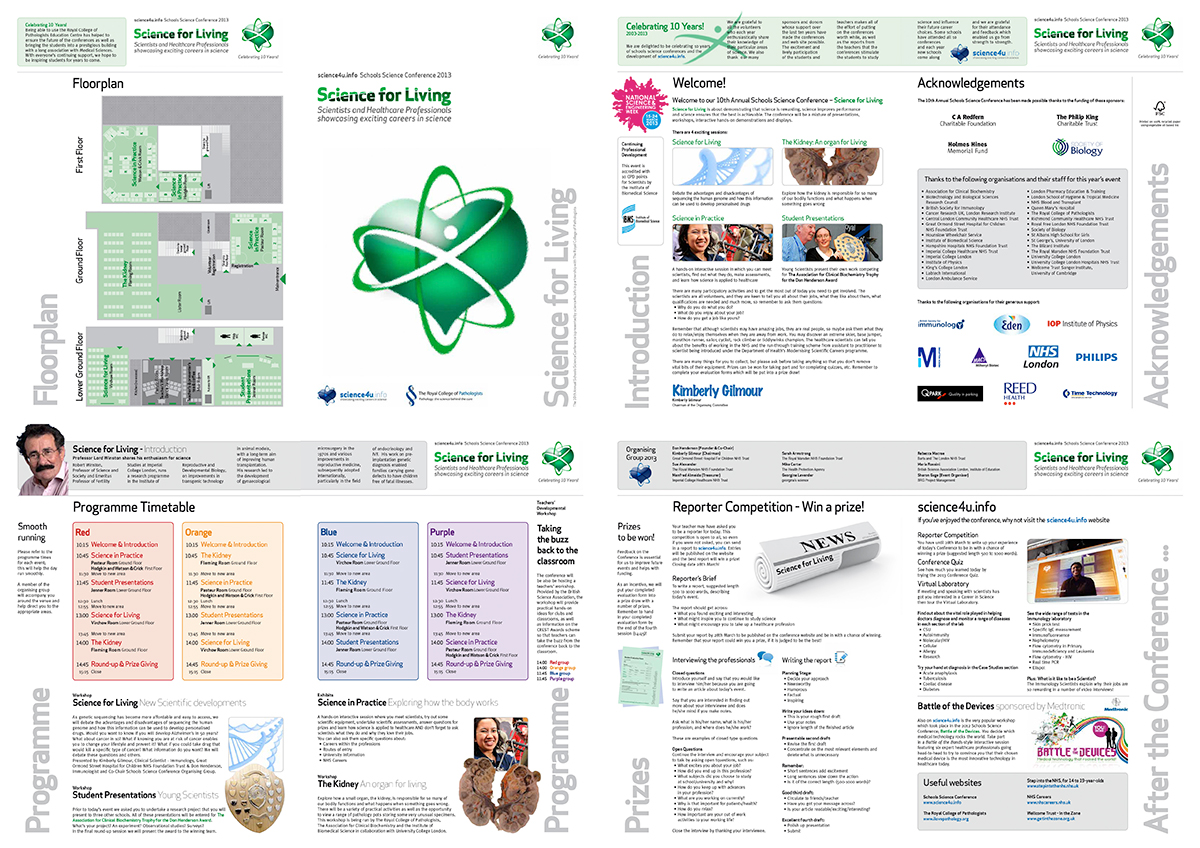The 10th Schools Science Conference comprised the following exciting sessions:
- Welcome & Introduction
- Science for Experimentation – Young scientists present their own work
- Science for Interaction
- Science in Practice
- The Kidney: An organ for Living – Interactive Workshop
- Science for Living – Interactive Workshop
- Science for Educators – CPD Teachers’ Workshop
- Science for Inspiration
- Keynote speech
- Round-up & Prize Giving
Science in Practice
Interactive Exhibits
Meet the Scientists and Healthcare Professionals
Hands-on interactive sessions where you meet scientists, try out some scientific equipment, undertake scientific assessments, answer questions for prizes and learn how science is applied to healthcare.
You can also ask them specific questions about:
- Careers within the professions
- Routes of entry
- University information
- NHS Careers
AND don’t forget to ask scientists what they do and why they love their jobs.
The Kidney: An organ for living
Interactive Workshop
Presented by The Royal College of Pathologists, The Association for Clinical Biochemistry and the Institute of Biomedical Science in collaboration with University College London
Explore how a small organ, the kidney, is responsible for so many of our bodily functions and what happens when something goes wrong.
There will be a variety of practical activities as well as the opportunity to view a range of pathology pots storing some very unusual specimens.
Science for Living –
New scientific developments
Interactive Workshop
Presented by Kimberly Gilmour,
Clinical Scientist – Immunology, Great Ormond Street Hospital for Children NHS Foundation Trust &
Don Henderson
Immunologist and Co-Chair Schools Science Conference Organising Group
As genetic sequencing has become more affordable and easy to access, we will debate the advantages and disadvantages of sequencing the human genome and how this information can be used to develop personalised drugs.
- Would you want to know if you will develop Alzheimer’s in 50 years?
- What about cancer in 10?
- What if knowing you are at risk of cancer enables you to change your lifestyle and prevent it?
- What if you could take drug that would kill a specific type of cancer?
- What information do you want?
We will debate these questions and others.
Don Henderson Award
Competition
Young Scientists present their own work
Prior to today’s event we asked you to undertake a research project that you will present to the other schools in your group.
All presentations will be competing for The Association for Clinical Biochemistry & Laboratory Medicine Trophy for the Don Henderson Award.
The award will be presented at the end of the day.
CPD Teachers’ Workshop –
Taking the buzz back to the classroom
Presented by British Science Association
The conference will be also be hosting a teachers’ workshop. Provided by the British Science Association, the workshop will provide practical hands-on ideas for clubs and classrooms, as well as information on the CREST Awards scheme so that teachers can take the buzz from the conference back to the classroom.
Professor Lord Winston
shares his enthusiasm for science
Keynote Speaker
Professor Lord Winston
Robert Winston, Professor of Science and Society and Emeritus Professor of Fertility Studies at Imperial College London, runs a research programme in the Institute of Reproductive and Developmental Biology, on improvements in transgenic technology in animal models, with a long-term aim of improving human transplantation.
His research led to the development of gynaecological microsurgery in the 1970s and various improvements in reproductive medicine, subsequently adopted internationally, particularly in the field of endocrinology and IVF.
His work on preimplantation genetic diagnosis enabled families carrying gene defects to have children free of fatal illnesses.
Professor Lord Winston
Professor of Science and Society and
Emeritus Professor of Fertility Studies, Imperial College London





